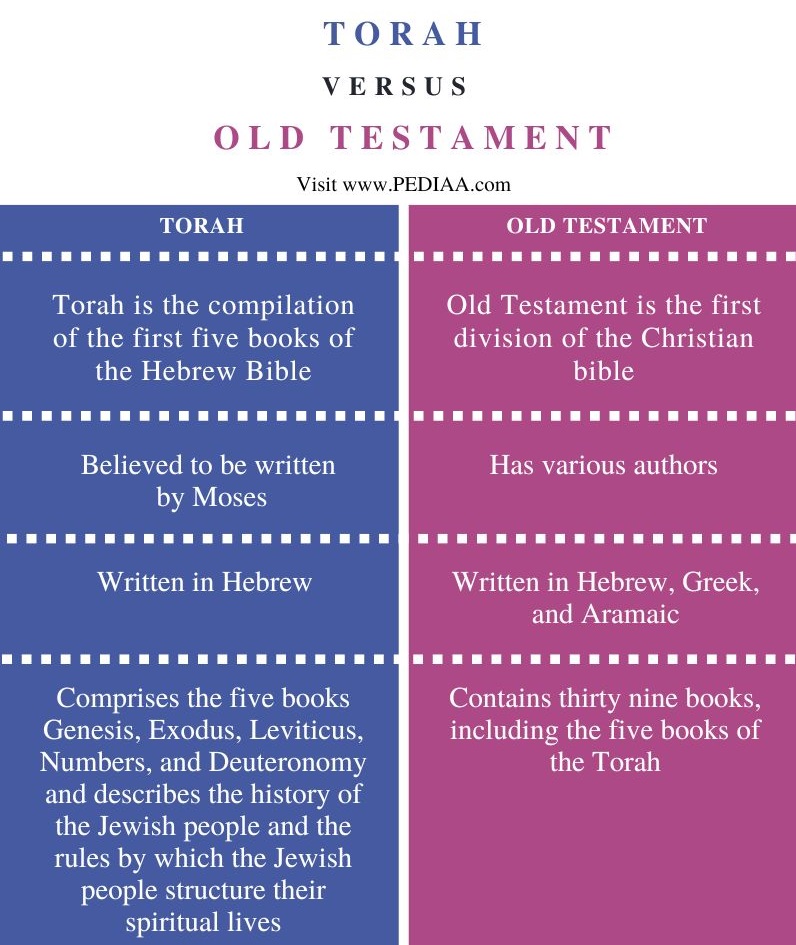The Torah and the Old Testament are often discussed in religious and scholarly circles, yet many wonder about their similarities and differences. Are they truly the same, or do they represent distinct teachings? This article aims to clarify the complexities surrounding these two foundational texts of Judaism and Christianity. By delving into their origins, content, and interpretations, we can gain a deeper understanding of their roles in their respective faiths.
For centuries, the Torah has been the cornerstone of Jewish tradition, encompassing the first five books of the Hebrew Bible. It is a sacred text that outlines not only the laws and commandments that govern Jewish life but also the narratives that shape Jewish identity. On the other hand, the Old Testament serves as the foundational scripture for Christianity, containing a broader collection of texts that include historical accounts, poetry, and prophecies, with the Torah being a part of it.
This article explores whether the Torah can be considered the Old Testament by examining the historical context, textual content, and theological implications. Through this exploration, we hope to provide clarity and foster a deeper appreciation for these important religious texts.
What Is the Torah?
The Torah, also known as the Pentateuch, consists of the first five books of the Hebrew Bible—Genesis, Exodus, Leviticus, Numbers, and Deuteronomy. It is revered in Judaism as the written record of God's commandments and the teachings given to the Israelites. The Torah encompasses various genres, including historical narrative, legislation, and religious instruction. It is traditionally believed to have been written by Moses, although modern scholarship suggests that multiple authors contributed to these texts over time.
What Is Included in the Old Testament?
The Old Testament contains a diverse collection of texts that extend beyond the Torah. While the first five books are part of the Old Testament, it also includes historical books (such as Joshua and Kings), wisdom literature (like Proverbs and Ecclesiastes), and prophetic writings (including Isaiah and Jeremiah). This aggregation of texts reflects the history and faith journey of the people of Israel and serves as a foundational scripture for Christians.
How Are the Torah and Old Testament Structured?
In terms of structure, the Torah is often presented as a cohesive unit, focusing on the laws and teachings given to the Israelites. In contrast, the Old Testament is organized into different sections, including the Historical Books, Wisdom Literature, and the Prophets. This broad structure allows for a more comprehensive exploration of the themes and messages within the text.
Is the Torah the Old Testament or Part of It?
The question of whether the Torah is the Old Testament can be answered affirmatively: the Torah is indeed a part of the Old Testament. However, it is essential to recognize that the Old Testament encompasses much more than just the Torah. It includes additional writings that provide context and depth to the biblical narrative. This distinction is crucial for understanding both the Jewish and Christian perspectives on scripture.
How Do Judaism and Christianity View the Torah and Old Testament?
Judaism regards the Torah as the ultimate authority, containing the divine laws and commandments essential for Jewish life and practice. It is studied and revered in synagogues and homes, with a significant focus on its interpretation and application. Christianity, on the other hand, views the Old Testament as a precursor to the New Testament, which contains the teachings of Jesus Christ. While Christians respect the Torah, they often interpret its teachings in light of Christ’s life and message.
What Are the Theological Implications of the Torah as the Old Testament?
The theological implications of viewing the Torah as part of the Old Testament are profound. For Jews, the Torah is the foundation of their covenant with God, guiding their ethical and spiritual lives. For Christians, understanding the Torah within the context of the Old Testament emphasizes the continuity of God's revelation and the fulfillment of the law through Jesus Christ. This perspective fosters dialogue between the two faiths and highlights both their shared beliefs and distinct practices.
Conclusion: Is the Torah the Old Testament?
In summary, the Torah is a crucial component of the Old Testament, holding a unique place in both Judaism and Christianity. While it serves as the foundation of Jewish law and identity, it also forms part of a larger narrative in the Old Testament that is essential for Christian theology. Understanding the relationship between these two texts enriches our appreciation of their significance and encourages interfaith dialogue.
Understanding Baruch Hashem Meaning: A Deep Dive Into Its Significance
Understanding The Concept Of 304: A Deep Dive
Enchanting Elegance: The Allure Of Half Up Half Down Prom Hair


